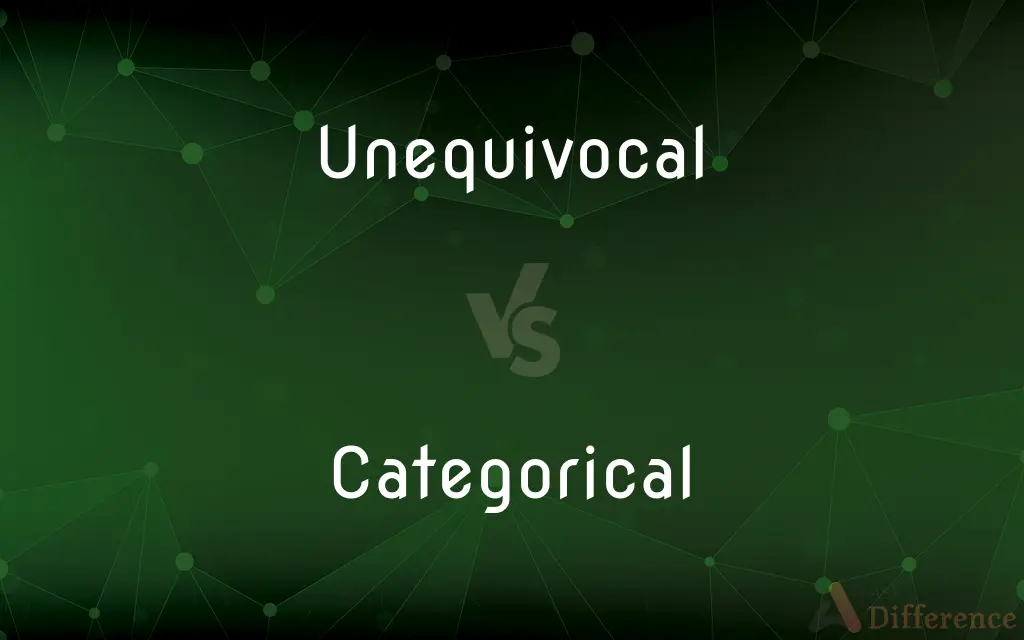Unequivocal vs. Categorical — What's the Difference?
By Maham Liaqat & Urooj Arif — Updated on April 26, 2024
Unequivocal statements leave no room for doubt or misunderstanding, focusing on clarity, while categorical statements are absolute, often with no exceptions.

Difference Between Unequivocal and Categorical
Table of Contents
ADVERTISEMENT
Key Differences
Unequivocal statements are marked by their clarity and definitiveness, leaving no room for ambiguity or misinterpretation. On the other hand, categorical statements are explicitly clear but emphasize a total or unqualified assertion. This distinctiveness is crucial in contexts like legal arguments or academic discussions, where precision in language impacts interpretation.
While unequivocal communication is prized for its clarity, it is often used to express a point clearly and without confusion, particularly in negotiations or instructions. Whereas, categorical statements serve as definitive positions without room for negotiation, often seen in policies or doctrinal beliefs.
Unequivocal language facilitates understanding by being straightforward and clear, making it ideal for instructional material or user guides. On the other hand, categorical language asserts absolute truths or commands, which are commonly found in legal documents or strict guidelines.
In discussions that require clear guidelines, unequivocal terms help in setting precise expectations. In contrast, categorical terms are used when establishing non-negotiable rules or standards, reinforcing their uncompromising nature.
Unequivocal expressions ensure that the communication is received as intended, minimizing the chances of misinterpretation. Conversely, categorical expressions are used to convey decisions or rules that are intended to be final and not subject to change.
ADVERTISEMENT
Comparison Chart
Definition
Clear and unambiguous
Absolute and unconditional
Usage Context
Instructions, guides, clarifications
Policies, commands, doctrines
Implication of Flexibility
None, but focuses on clarity
None, emphasizes finality
Tone
Direct and clear
Firm and definitive
Common Fields of Use
Education, business communication
Law, governance, organizational policies
Compare with Definitions
Unequivocal
Leaving no room for misunderstanding or doubt.
Her unequivocal rejection was final.
Categorical
Belonging to a category, absolute.
His support was categorical.
Unequivocal
Expressed in a way that is clearly understood.
His answer was unequivocal.
Categorical
Involving categories or classifications.
A categorical system of species classification.
Unequivocal
Not subject to conditions or exceptions.
The agreement was unequivocal.
Categorical
Unconditionally absolute.
The categorical prohibition against smoking was enforced.
Unequivocal
Absolutely clear and firm.
He was unequivocal about his intentions.
Categorical
Not admitting of any exception or qualification.
She was categorical in her refusal.
Unequivocal
Completely clear and without any possibility of doubt.
The teacher gave an unequivocal explanation of the rules.
Categorical
Pertaining to categories in philosophy or logic.
A categorical proposition asserts something unconditionally.
Unequivocal
Admitting of no doubt or misunderstanding; clear and unambiguous
An unequivocal success.
Categorical
Being without exception or qualification; absolute
A categorical refusal.
Unequivocal
Unambiguous; without equivocation or ambiguity; singularly clear, unmistakable, or unquestionable
I want you to give me an unequivocal guarantee on that.
Categorical
Of or relating to a category or categories.
Unequivocal
Without equal, matchless.
The unequivocal scope of the Golden Gate Bridge
Categorical
According to or using categories
A categorical arrangement of specimens.
Unequivocal
Not equivocal; not doubtful; not ambiguous; evident; sincere; plain; as, unequivocal evidence; unequivocal words.
Categorical
Absolute; having no exception.
Unequivocal
Admitting of no doubt or misunderstanding; having only one meaning or interpretation and leading to only one conclusion;
Unequivocal evidence
Took an unequivocal position
An unequivocal success
An unequivocal promise
An unequivocal (or univocal) statement
Categorical
Of, pertaining to, or using a category or categories.
Unequivocal
Clearly defined or formulated;
The plain and unequivocal language of the laws
Categorical
(logic) A categorical proposition.
Categorical
Of or pertaining to a category.
Categorical
Not hypothetical or relative; admitting no conditions or exceptions; declarative; absolute; positive; express; as, a categorical proposition, or answer.
The scriptures by a multitude of categorical and intelligible decisions . . . distinguish between the things seen and temporal and those that are unseen and eternal.
Categorical
Relating to or included in a category
Categorical
Not modified or restricted by reservations;
A categorical denial
A flat refusal
Common Curiosities
Why is unequivocal communication important in instructions?
It prevents misunderstanding and ensures that the instructions are followed precisely as intended.
Can unequivocal and categorical be used interchangeably?
While both imply clarity and definitiveness, categorical often includes a sense of absoluteness that unequivocal does not inherently carry.
What are examples of contexts where unequivocal terms are preferred?
In educational materials, user manuals, and business communications where clarity is paramount.
How do categorical terms affect policy-making?
They establish firm rules and standards that are meant to be followed without exception.
What does it mean when something is described as unequivocal?
It means it is absolutely clear and leaves no room for doubt or confusion.
How do categorical statements function in legal contexts?
They are used to assert rules or laws absolutely, with no room for interpretation or deviation.
How do unequivocal statements enhance communication?
They ensure clarity and prevent misinterpretation by being direct and explicit.
What makes a statement categorical in philosophy?
It asserts something in an absolute, unqualified manner, often used in logical or philosophical arguments.
Are all categorical statements also unequivocal?
Yes, categorical statements are unequivocal in nature, but they also carry an additional weight of being absolute.
Is there a difference in the tone between unequivocal and categorical statements?
Yes, unequivocal statements are simply clear, whereas categorical statements are both clear and firm.
Can a statement be unequivocal but not categorical?
Yes, it can be clear and explicit without necessarily being absolute or without exceptions.
Why might a legal document use categorical language?
To enforce rules or laws strictly, ensuring there are no deviations or ambiguities.
Share Your Discovery

Previous Comparison
Phakia vs. Aphakia
Next Comparison
Paint vs. VarnishAuthor Spotlight
Written by
Maham LiaqatCo-written by
Urooj ArifUrooj is a skilled content writer at Ask Difference, known for her exceptional ability to simplify complex topics into engaging and informative content. With a passion for research and a flair for clear, concise writing, she consistently delivers articles that resonate with our diverse audience.
















































